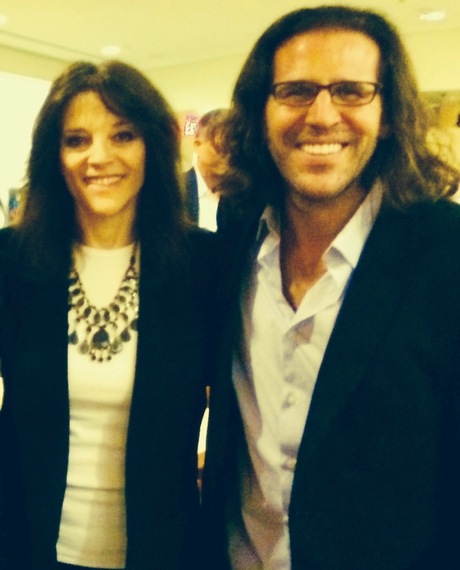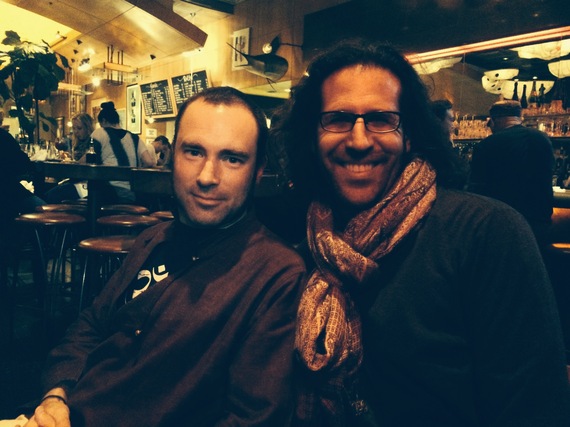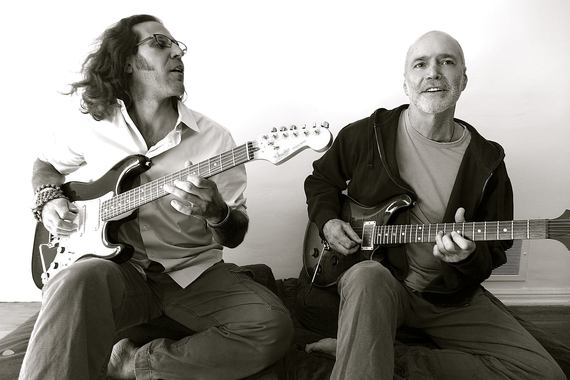Whereof one cannot speak, thereof one must be silent.
~ Ludwig Wittgenstein, "Traktats Logico-Philosophicus"
Last week I was on a date with a lovely woman and on the way to dinner we had to sort out our dietary restrictions - as one must do here at the edge of Western Civilization.
"I'm an ethical vegetarian," I told her, "but I occasionally make exceptions for extremely high quality crab and shrimp who graciously donate their bodies to the enhancement of my taste buds."
"Oh, so you're a pescatarian," she countered.
"No," I answered, "I'm a vegetarian - I'm just a bad vegetarian. And you?"
"I'm vegan but I have to have one latte a day," she said.
"Oh, so you're a vegetarian," I clarified.
"No, I'm a vegan - I'm just a bad vegan," she shot back allowing us to both wallow in our hypocrisies.
The human mind is magically adept at manipulating language and concepts so that we all can perfectly rationalize and justify our particular beliefs and behaviors where the same beliefs and behaviors in others would seem absurd, nonsensical, irrational.
I read Georg Feuerstein's and David Gordon White's academic treatises on ancient, esoteric tantric practices but still cannot discern the fundamental phenomenological difference between tantra and vedanta, so I consulted with a few people who are much wiser than I am regarding the following apparent contradiction: according to vedanta, the tools of yoga and meditation were devised and designed to enable people to transcend their minds and realize their essential divinity, which is obfuscated by maya. Maya is everything we perceive through our five senses.
Whatever we can think, whatever rises to awareness, whatever is represented by language, is NOT Brahman, not divine, not "Real." Yoga and meditation are practices to guide us to the blissful, calm state - turiya - on the other side of language, an ineffable state that can only be indicated, never actually expressed. It is para-linguistic, beyond words. In this tradition, if the voice in your head says, "I am meditating" or "I am doing an asana" then you are NOT meditating or experiencing the nectar of yoga. You can only know that clear, clean prana (essential lifeforce, breath) retroactively.
In contrast, Buddha taught that there is no Self and no God; thus, there is nothing to transcend and no state to transcend to. Mindfulness meditation is akin to exercising; it is employed to strengthen one's mind, which - left to its own devices - will run amok and cause suffering.
One lineage of Buddhism teaches that enlightenment is reached when one experiences nirvana in samsara. This informs my perception of tantra in general and non-dual tantra in particular. Tantrikas, who consider vedantins to be "life-denying," believe that everything that rises to awareness is divine. However, tantrikas still use tools such as meditation and yoga (as well as sex and other rituals) to connect with the divine.
So here is the apparent contradiction: if everything is already divine for tantrikas, why do they bother practicing meditation or yoga?
The first person I asked was Matthew Remski whose book, "The Threads of Yoga", is a masterpiece and should be mandatory reading in all yoga teacher training programs. Matthew told me that "The intellectual differences may be semantic, but they are a world apart in terms of culture and practice. My own take on that material is that non-dual propositions of all stripes are retronyms for peak experiences that then become articles of faith, and as such fail to really adjust for new developments that paint a more intersubjective picture."
Similarly, Christopher Wallis told me that tantra and vedanta "are completely different" but I assume that he meant culturally and practically as Matthew stated, not in the actual phenomenological experiencing of the divine.
Stuart Sovatsky, whose comprehensive book "Advanced Spiritual Intimacy" will be released next month and is already used by Brenda Feuerstein in her teaching training program, said that "Vedantists teach that non-changing "witness consciousness" is your true essence in which everything else emerges and passes and say knowing this is Enlightenment. Tantrics claim that consciousness itself inherently and endlessly vibrates and, via all sorts of yogic or tantric practices, endless varieties of enlightenments can emerge such as intuitive, intellectual, poetic-musical, and lifelong marriage creativities. Tantric devotional eroticism is another example, but it is based in human fertility and remains unknown in the modern, largely seed-controlled sexuality and neo-tantras of today and is of no special interest or non-interest to the observant, practice-free, Vedantist."
In Berkeley a few years ago I attended a talk by A. H. Almaas who claimed that vedanta was a failed project because one can only experience the divine from his/her subjective point of view; however, since then I have spoken with scores of people who have done ayahuasca journeys and reported that their minds were temporarily shattered and their selves dissolved. This seems identical to the individual (Atman) merging with the Godhead (Brahman) as indicated in the Upanishads (vedanta).
In her book "Tending the Heart Fire: Living in Flow with the Pulse of Life," Shiva Rea writes, "Within tantra, there is an emphasis on a direct experience of divine reality that has transcendent and immanent aspects, called Shiva and Shakti, respectively. Shiva is primarily understood as pure consciousness that is the ultimate ground of being, while Shakti is the flowing energy making up the entire manifest universe." I think this distinction that Shiva Rea makes is very important but it stills reminds me of purusa and prakriti of Samkhya as well as the Ein Sof and Sefirot of Kabbalah - latent reality and manifest reality. But how do the two relate to each other and interact? (Alan Wallace explained it to me in terms of "probability waves" but I cannot go into that here.)
Recently I made the acquaintance of Marianne Williamson who teaches A Course in Miracles, which states that "Nothing real can be threatened. Nothing unreal exists." I believe that Marianne, like Christopher and Matthew, would say that A Course in Miracles is distinct from vedanta in many ways, but it seems to me as if any fundamental philosophical differences could be just be semantic.

Steve Ross told me that "Vedanta views manifestation as an appearance that needs to be transcended in order to experience divine Reality, whereas Tantra views everything as Reality (as stated in the Svacchandra Tantra: "Nashivam Vidyate Kvachit" which means, "Nothing exists that is not God"). However, the means to experiencing divine Reality in both paths may be meditation. The reason that tantrikas meditate and do asanas is the same reason vedantins do: they want to EXPERIENCE Reality beyond the confines of mere conceptualization. Knowing mentally and experiencing directly are two vastly different things."
I've often been taught that there is "One mountain... many paths" and I teach in my workshops that everyone must find the individual tools that work for him or her in correspondence with his or her personal paradigms.
For me, personal integrity means that we do our best to mitigate our hypocrisies.
I am willing to consider the possibility that some of the above falls into the category that the Buddha designated as "unprofitable questions," but I think you will agree that it makes for a nice chat. If you are interested in discussing these ideas further - as well as practicing many different types of yoga and meditation and enjoying amazing ("bad vegetarian") food, luscious natural baths, and ecstatic music - please join me at Esalen.


